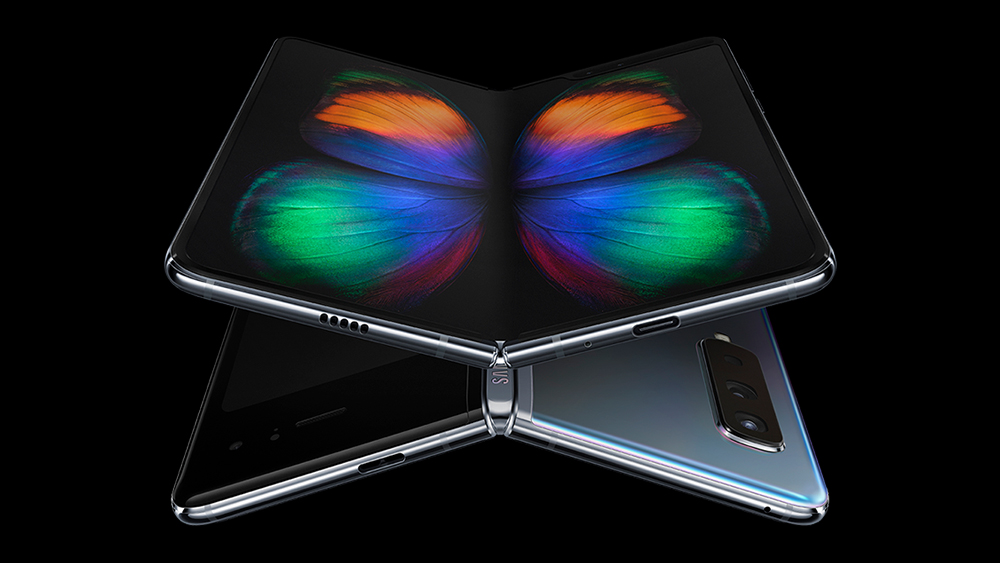The Samsung Galaxy Fold has just made foldable-screen laptops more likely
Samsung has shown how it's done

Sign up for breaking news, reviews, opinion, top tech deals, and more.
You are now subscribed
Your newsletter sign-up was successful
Despite making a smartphone that could one day replace our laptops with the Galaxy Note 9, there wasn’t a huge amount to get excited about for us computing folk at Samsung's Galaxy S10 launch event. However, the Samsung Galaxy Fold, the company’s first foldable phone, could have huge ramifications for the future of laptops and tablets.
We’ve been hearing so many rumors lately of all kinds of manufacturers – from Dell to Lenovo and even Microsoft – looking at creating foldable laptops with flexible screens, but the Samsung Galaxy Fold is the first time we’ve seen a foldable device that appears to work as well as it promises, while remaining a desirable bit of kit.
Of course, every laptop by its very nature is foldable, but could we soon see laptops with a single, bendable, screen that acts as both a traditional display and a keyboard?
With Samsung proving that it can be done, I think we’re now even closer than ever before to seeing foldable-screen laptops.
Working it out
While we’ve seen plenty of patent drawings that show vague sketches of foldable devices, Samsung’s reveal of the Galaxy Fold showed us that it’s possible to design a stylish-looking foldable device.
Of course, Samsung isn’t the first company to produce a working foldable device, but others, such as the Royole FlexPai that we saw at CES 2019, felt more like early proof of concepts, rather than fully-fledged devices that you’d be able to buy (or want to show off).

With the Galaxy Fold sporting a 4.6-inch HD+ Super AMOLED (21:9) display that folds out into a 7.3-inch QXGA+ (QHD+) Dynamic AMOLED (4.2:3) Infinity Flex display, it shows that this is a form factor that is viable and could conceivably be used for larger screens.
Sign up for breaking news, reviews, opinion, top tech deals, and more.
Samsung has also packed in batteries that offer a total of 4,380mAh over the two halves of the device, again showing how it could be possible for laptop makers to split batteries in a foldable laptop.
A number of laptops have the ability to run off two batteries – for example the Microsoft Surface Book 2 has a battery both in the keyboard and behind the screen, for when the keyboard detaches and it’s used in tablet mode.
Software
It’s not just the hardware of the Samsung Galaxy Fold that proves that foldable laptops can exist. As Samsung explained at its launch event, it has worked with a number of developers to bring compatible apps to the Galaxy Fold, including WhatsApp, YouTube, and perhaps most interestingly of all, Microsoft Office.
The fact that Microsoft is working with Samsung to make its products compatible with a folding device, along with rumors that the company is working on ways to make Windows 10 work on foldable devices, means it appears very likely that we’ll be seeing foldable Windows laptops in the not too distant future.

The price of flexibility
The final hint we can take from the Galaxy Fold’s launch in relation to possible foldable laptops is the price. When Samsung makes a premium product, it usually comes with a very premium price tag, and the Galaxy Fold is no different, with a staggering asking price of $1,980 (around £1,500, AU$2,800).
That’s hugely expensive for a smartphone – no matter how innovative it is – and if a lot of that price is down to the foldable tech, then I imagine that any foldable laptop, which will come with a larger foldable display, along with more powerful components, could see the price climb even further.
The bottom line is, when these foldable laptops do emerge, they are likely to be very expensive indeed.
Foldable laptops coming soon
So, while we were never in any doubt that foldable laptops are eventually coming, Samsung’s launch of the Galaxy Fold gives us a tantalizing glimpse of what a foldable laptop would be like.
Even if you’re not interested in Samsung’s expensive flexible smartphone, it points to exciting times ahead for a new generation of laptops.
- Here’s our pick of the best laptops of 2019

Matt is TechRadar's Managing Editor for Core Tech, looking after computing and mobile technology. Having written for a number of publications such as PC Plus, PC Format, T3 and Linux Format, there's no aspect of technology that Matt isn't passionate about, especially computing and PC gaming. He’s personally reviewed and used most of the laptops in our best laptops guide - and since joining TechRadar in 2014, he's reviewed over 250 laptops and computing accessories personally.